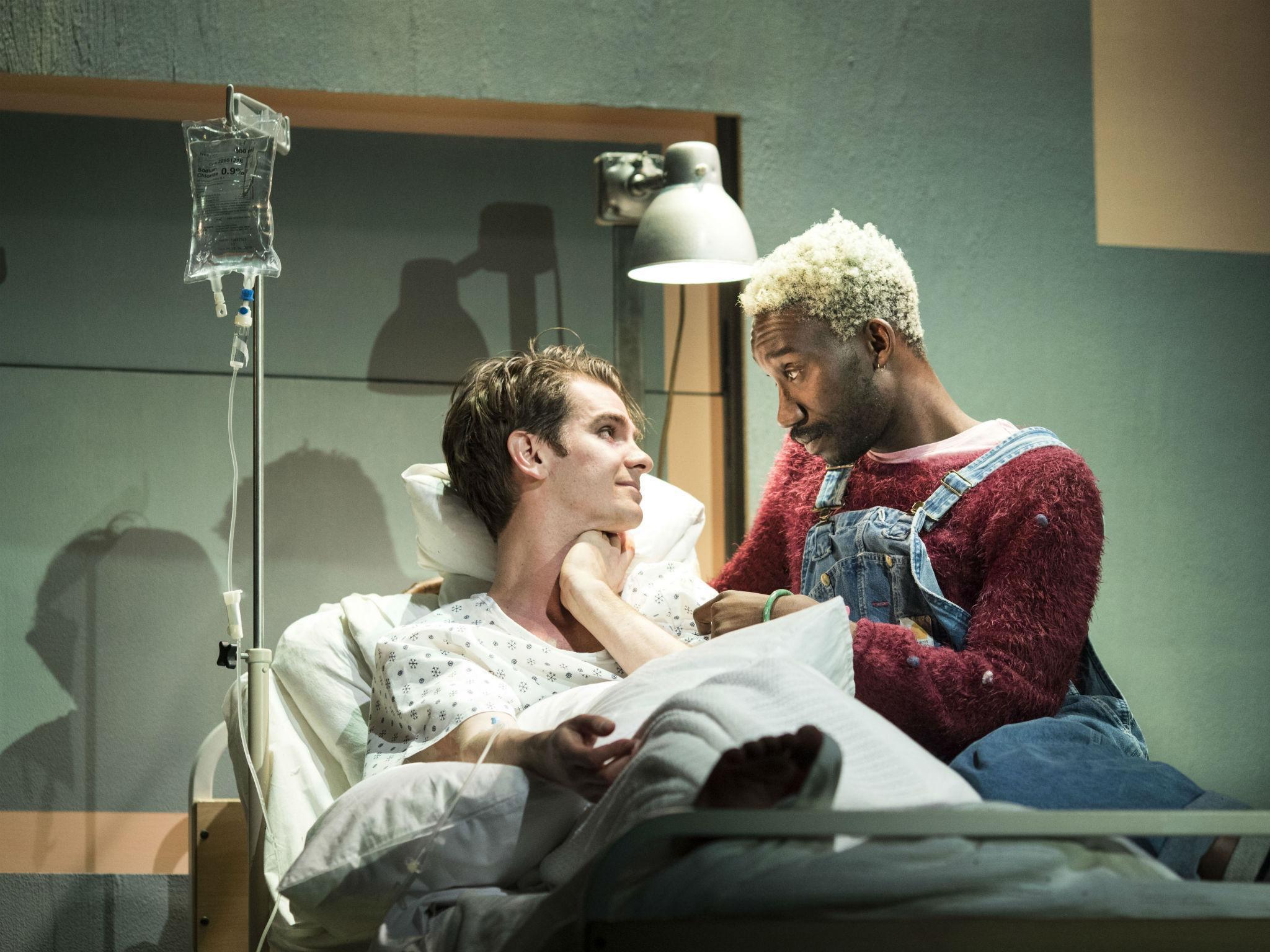Angels in America, National Theatre, London, review: This production sweeps you through the seven-and-a-half hour experience
A revival of Tony Kushner’s two-part epic – set in New York about gay rights amidst the Aids crisis and a Conservative Reagan administration – is directed by Marianne Elliott

The entire run has sold out in advance – apart from day seats and ballot tickets – for the National Theatre's most anticipated show of the year. And that feels like no more than justice as Marianne Elliott’s mighty, cast-to-the-hilt production sweeps you through the well-nigh seven-and-a-half hour experience of watching this revival of Tony Kushner's two-part epic about gay rights and gay responsibilities set in New York amidst the Aids crisis in the Reaganite America of the mid-1980s.
The conventional wisdom about this piece is that the first part, Millennium Approaches – unveiled in 1991 and ending with the Angel's spectacular cliffhanger as she crashes through the ceiling – is the more satisfying half. But here I felt that it wasn't just the angelic visitor who found her wings in Perestroika, the second play (first seen in 1993). Elliott's direction seems to develop a more robust confidence in the daring of the theatrical techniques that allow the characters to infiltrate each other's fantasy worlds, say, and to range from Antarctica and the damaged ozone layer to a Heaven that has been abandoned by God.
Desertion is the leitmotif of the drama. When 30-year-old Prior Walter (Andrew Garfield) gets sick with Aids, his lover, Louis Ironson (James McArdle), who can't cope with illness, walks out on him. Meanwhile. closeted Mormon lawyer Joe Pitt (Russell Tovey) and his deeply miserable, pill-popping wife Harper (Denise Gough) are in a terminally pretend-happy marriage (“buddy-kiss”). Garfield looks great in his Morticia Adams outfit of high-camp wronged-woman vengeance but in his “mutual dream” with Harper, you don't get an authentic sense of gay culture and its long history of using drag as a survival strategy, especially needed at this moment. We seem to be watching an actor falling back on stereotypes rather than a terrified character deploying them with pained courage and wit.
His passionate wrestling with Angel, though, is the best I've seen – which is greatly to the credit of Amanda Lawrence, who is brilliantly disconcerting (like a predatory cross between Phyllis Diller and Edith Sitwell) as this creature. In the version here, she keeps being reassembled by the six scuttling shadow-helpers that it takes to stretch out the full, daunting grey-rattle of her plumage.
It's a production that boasts some fine performances. Several of these are played by Susan Brown who, in addition to appearing as the world's oldest living Bolshevik and as a rabbi, offers a wonderful portrait of Hannah, Joe's conservative Mormon mom who shows the kind pluck and initiative, for which she has never been given credit, in seizing the moment and befriending Prior through a desperate patch. She also surfaces as the ghost of Ethel Rosenberg who comes to gloat over the terminal agonies of her nemesis Roy Cohn and is inveigled into saying the Kaddish prayer over his dead body.
Last seen in London as Max Bialystock in The Producers, Nathan Lane turns in a superbly searching account of the presiding demon of these plays. He presents what is monstrous and incorrigible about this man who refuses to accept that he's gay or that he has Aids – because gay men, by definition, have no clout and he can get Nancy Reagan to the phone in under five minutes – and, without sentimentalising these propensities in the slightest, he arouses an uncomfortable but real compassion for Cohn's agonising decline and for his frustrated attempts to gain a father's intimacy with Joe Pitt.
The routine self-rebuke and spiritual limitations are nicely caught by Russell Tovey. The excellent Denise Gough is angrier and harsher than your average Harper and you almost cheer when she finally sends this spouse on his way with a slap, a handful of valium and an injunction to explore.
Nathan Stewart-Jarrett achieves a perfect poise of sardonic, undercutting wit and the gentle practicality as the nurse and ex-drag queen, Belize. But his kind of solidarity is in short supply amongst the characters of Angels in America. The hectic infuriating gabble of people who would rather sit and theorise than do anything that requires sacrifice has been perfected by McArdle's splendidly awful Louis. Kushner's “Gay Fantasia on National Themes” raised and raises consciousness and emerges here as both a sharp, moving account of how the Aids crisis emphasised the “limits of toleration” and timely reminder – given the new administration – that civil rights can never be taken for granted.
'Angels in America' will also be broadcast to cinemas by NT Live from 20 July
Subscribe to Independent Premium to bookmark this article
Want to bookmark your favourite articles and stories to read or reference later? Start your Independent Premium subscription today.

Join our commenting forum
Join thought-provoking conversations, follow other Independent readers and see their replies